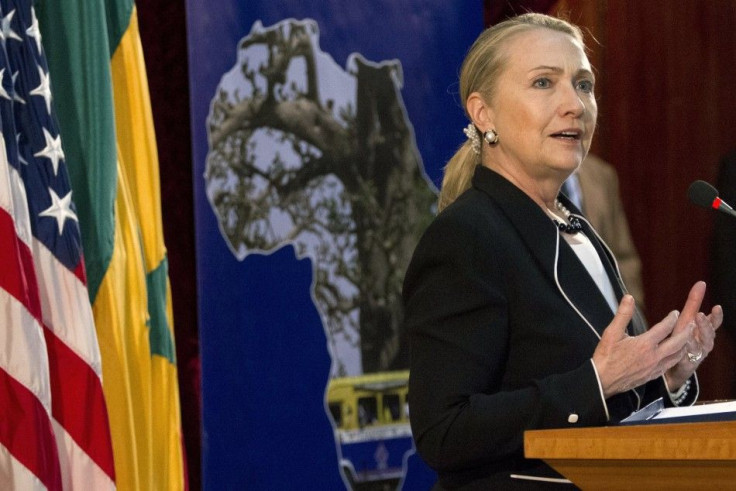Clinton Praises South Africa's Anti-AIDS Efforts; U.S. Will Renew Funding

The U.S. Secretary of State Hillary Clinton, on a visit to South Africa, known globally for its high incidence of AIDS, praised the government's efforts to prevent the spread of the virus. Both the nations will sign an agreement Wednesday to reinstate the U.S. anti-AIDS funding, which was cut back during former South African President Thabo Mbeki's tenure.
In a high-level dialogue between the two nations, Clinton met with the Foreign Minister Maite Nkoana-Mashabane and other senior officials in the capital of Pretoria on Tuesday.
An estimated 5.6 million people were living with HIV and AIDS in South Africa in 2009, the highest number of people in any country. In the same year, an estimated 310,000 South Africans died of AIDS-related causes.
An estimated 17.8 percent among those aged 15-49, are believed to have contracted the virus, according to a 2010 UN report on the global AIDS epidemic. The prevalence of HIV among those aged two and older also varies by province with the Western Cape (3.8 percent) and the Northern Cape (5.9 percent) being least affected, and Mpumulanga (15.4 percent) and KwaZulu-Natal (15.8 percent) showing higher figures.
President Barack Obama's Emergency Plan for AIDS Relief (PEPFAR), an initiative launched under former President George W. Bush, has spent $3.2 billion on anti-retroviral drugs and HIV prevention programs in South Africa since 2004.
"Together, I think it's fair to say we have saved hundreds of thousands of lives," said Clinton, according to an Associated Press report.
"South Africa is taking the lead and I want publicly to commend your minister of health and his associates who are widely being given great admiration around the world for the success of their efforts," she said.
In a veiled criticism of China's role in Africa, Clinton told a university audience in Senegal last week that African leaders should embrace democracy and partnerships with responsible foreign powers to improve living standards and address extremism.
She said U.S. was committed to "a model of sustainable partnership that adds value, rather than extracts it from Africa." Unlike other countries, "America will stand up for democracy and universal human rights even when it might be easier to look the other way and keep the resources flowing."
Though she didn't name China, her statement suggesting that African nations reevaluate their relationship with the Asian nation became a subject of controversy. The official Chinese news agency Xinhua wrote in response: "Whether Clinton was ignorant of the facts on the ground or chose to disregard them, her implication that China has been extracting Africa's wealth for itself is utterly wide of the truth."
Clinton was vocal about the responsible nature of the U.S. aid to Africa saying that it seeks to add value and not extract it.
"When our companies do invest we want to make sure that it is the people of South Africa that reap the benefits, that our companies are good stewards, that the economic opportunities we help to create generate broad-based prosperity," she said.
"We don't want to see the bulk of the benefits of our economic engagement to go to a small group of elites or to foreign companies," Clinton said. "We want it to empower people."
The U.S. government, however, reportedly funds only abstinence and prevention programs while excluding projects that distributes condoms. Obama had earlier promised to move funds from ineffective "abstinence-only" programs to comprehensive sexual health programs, and to repeal the U.S. entry ban on people with HIV.
The U.S. also requires American-funded treatment programs to purchase U.S. brand name drugs instead of cheaper generics.
The U.S. officials said that South Africa would be the first PEPFAR country that will begin to "nationalize" its program, according to a Reuters report. The program has an estimated $460 million in aid for South Africa in 2013, but U.S. officials say that the amount may drop in the next five years.
The U.S. limited access to the funds when Jacob Zuma's predecessor Mbeki resorted to statements and policies denying the scientifically proven facts about the disease. He questioned the link between HIV and AIDS and claimed he had never met anyone with the disease.
Mbeki's Minister of Health, Manto Tshabalala-Msimang, prescribed traditional medicine and a "positive attitude" as an alternative to anti-retroviral treatment rather than as components of AIDS treatment and support program.
When Mbeki fell from power in 2008, a new Health Minister, Barbara Hogan, was appointed, who steered the government's anti-AIDS efforts in the right direction after years of neglect under her predecessor.
© Copyright IBTimes 2025. All rights reserved.






















